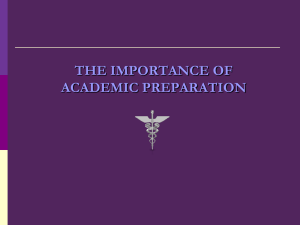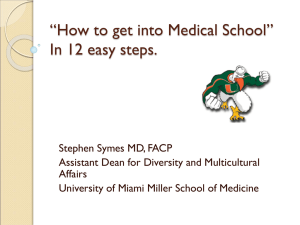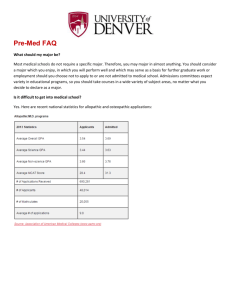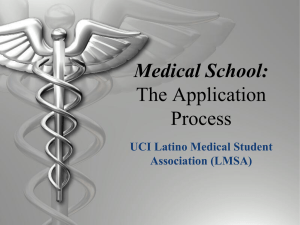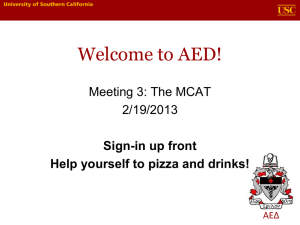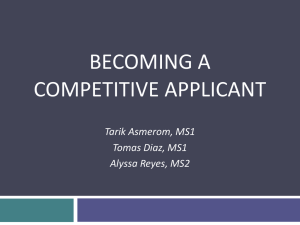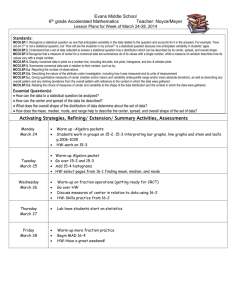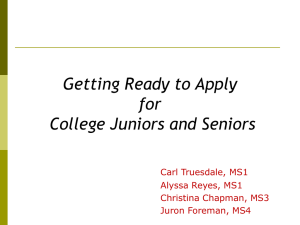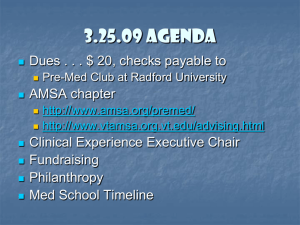Freshman-Sophomore Presentation
advertisement
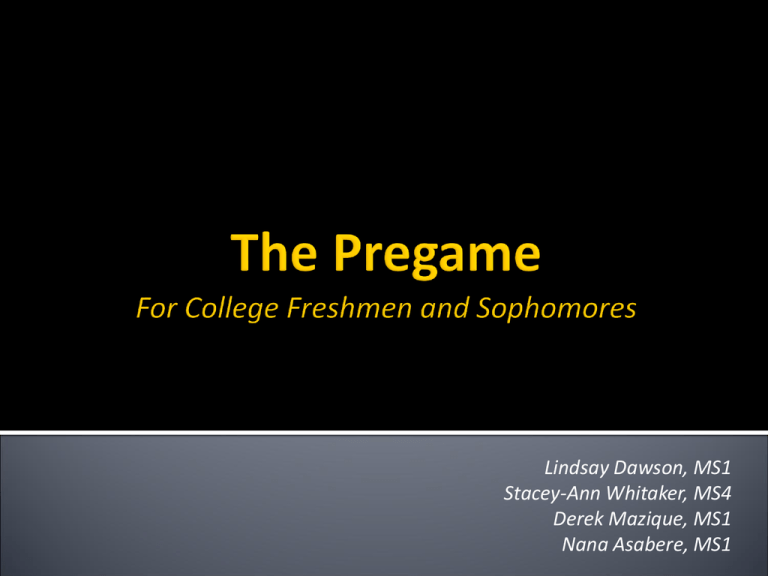
Lindsay Dawson, MS1 Stacey-Ann Whitaker, MS4 Derek Mazique, MS1 Nana Asabere, MS1 Although medical school is at least 2-3 years away, there are steps you can take to better prepare yourself for the application process, and for life after graduation. There is no magic formula to get into medical school, and no Penn Med student has an identical journey. However, there are some basics which helped all of us succeed. Rule #1: Decide to devote a significant time commitment to preparing for medical school. Rule #2: Research national medical school acceptance data based upon GPA and MCAT scores. Rule #3: Seek advice from those well-versed in the medical school application process. Rule #4: Get to know your pre-med office! Confer with premed advisors, mentors, and upperclassmen who can support you through the application process. Attend a medical school recruitment fair to learn from representatives about their schools. AAMC Calender: http://www.aamc.org/calendar/careerfairs Register with AspiringDocs for information, guidance, and inspiration about preparation for medical school and medical careers. http://www.AspiringDocs.org Read “Monetary Decisions for Medical Doctors” which assists premedical and medial students in their planning for the financial aspects of the medical education. http://www.aamc.org/md2 The Medical School Admissions Requirements (MSAR) profiles every medical school in the US and Canada. Check the MSAR before applying to get a sense of what a school’s numbers are, their requirements, and their curricula. For example, more and more schools require biochemistry, and same require two semesters of calculus. Before applying to medical school, you must take the following courses (and LABS!): Biology General chemistry Organic chemistry Physics English/writing Meet with your pre-med advisor ASAP to discuss your plan for taking these courses. I am a wonderful, amazing person who… Rescued children from burning houses Built 50 houses with my bare hands by myself for 50 different families Volunteered in the ER Holds leadership positions in 10 different organizations It doesn’t matter that I have a 2.9 GPA and a 25 MCAT score, right??? WRONG! Grades matter. Don’t bank on being the outlier case. It’s stressful to take that risk (both financially and emotionally). No one will see how wonderful you are unless your numbers get by the screening. Medical School Admission Committees WILL NOT read every applicant’s personal statement and the rest of the application. Every school has to screen its applications to reduce the number they actually have to read. Once the screening process is done, then they start reading the applications. GPA (Grade Point Average) MCAT (Medical School Admissions Test) Fact and figures can be found at: https://www.aamc.org/data/facts/applicantmatriculant/ Table 19: MCAT scores and GPA’s for Applicants and Matriculants to US Medical Schools by Race and Ethnicity, 2009 For example, if you have a 2.9 and a 25 total MCAT… MCAT GPA: 2.802.99 18-20 Acceptees 21-23 24-26 27-29 30-32 33-35 36-38 39-45 17 56 89 65 33 8 . . Applicants 216 259 220 118 51 13 . . Acceptance Rate 2.7% 6.3% 21.4% 26.3% 36.8% 50.0% . . URM Applicants GPA Science All Other Overall MCAT VR PS BS WS 2009/2010 3.48 3.67 3.48 2009/2010 9.0 10.0 10.0 P URM First Year Matriculants GPA Science All Other Overall MCAT VR PS BS WS 2010 3.68 3.77 3.71 2010 11.0 12.0 12.0 Q Max GPA: 4.0 Max MCAT: 45 T (15 each section) Your early grades can have a lasting effect on the rest of college – make sure to maintain them! Balance your schedule and major – you should be challenged, but not to the point where you are unhappy and aren’t doing well. Don’t be ashamed or afraid to ask for help! Go to professor AND TA office hours! Work in groups to solve problems. Don’t get caught up in the hype of how others are doing (or how they claim they are doing). When things don’t go quite right, troubleshoot – ask yourself, “how can I do better next time?” The MCAT is a multiple choice, standardized test required for admission into medical school Tested subjects include: Biology Physics General Chemistry Organic Chemistry All sections except the Writing Sample will have many, many passage-based questions Don’t forget about the Verbal Reasoning and Writing sections of the MCAT You will need to get letters of recommendation that validate your worthiness as a candidate for medical school from: Pre-medical committee or adviser Faculty members Mentors Supervisors If possible, start an internship file at Career Services. When a course is over, ask the faculty for a letter – if not then, keep lines of communication open. GO TO OFFICE HOURS! Okay – good grades and MCAT scores are important to get past the screening. What else should I be thinking about? Extracurricular Activities! Allows you to develop personal interests outside of class and build leadership skills. Demonstrates you’re a well–rounded individual. Brings together people from different majors/ levels of education. Provides a chance to serve the community. Exposes you to health/medically – related project. Tip 1: Join extracurriculars you're interested in early, with the hope of a leadership role in junior/senior year. Tip 2: Don’t stretch yourself too thin! Seek quality opportunities, rather than quantity. Tip 3: Try to maintain a balance between extracurriculars and good grades. Activities in which you are genuinely interested. Organizations that allow you to use your talents. Outreach activities that acquaint you with community issues. Health or medically oriented programs/projects that provide or reinforce reasons for wanting to become a physician. Activities that allow you to add to your sense of self. Is there anything else I should consider? Shadow a physician! It’s one of those “intangible” (and unofficial) requirements to get into medical school. It provides you with clinical exposure and stories to talk about in the admission interview. Shadowing allows you to see what medicine and a physician’s life are like every day. It’s easy to set up and do. Meet with your pre-med/pre-health advisor Learn and know the required pre-med courses Begin basic science courses Seek volunteer experiences Look for summer programs Choose a major Run for an office Explore other health career options Become familiar with MCAT Seek honors and scholarships Ask for letters of recommendation Seek summer programs Let’s keep in touch! Lindsay Dawson, MS1 ldaw@mail.med.upenn.edu Stacey-Ann Whitaker, MS4: swhit@mail.med.upenn.edu Derek Mazique, MS1 mazique@mail.med.upenn.edu Nana Asabere, MS1 nasabere@mail.med.upenn.edu
